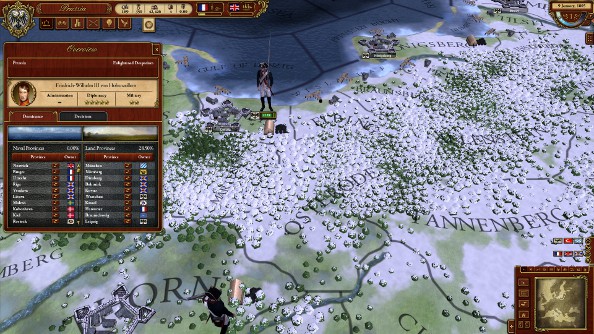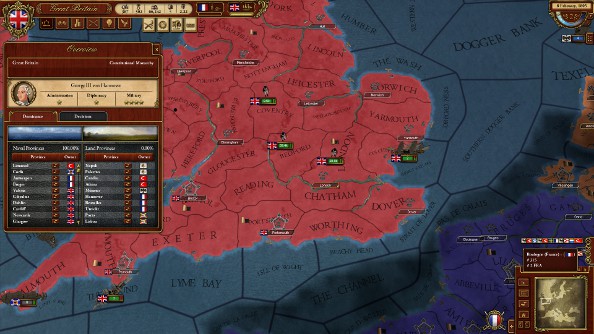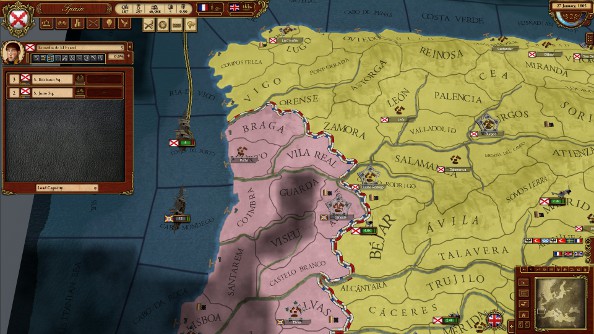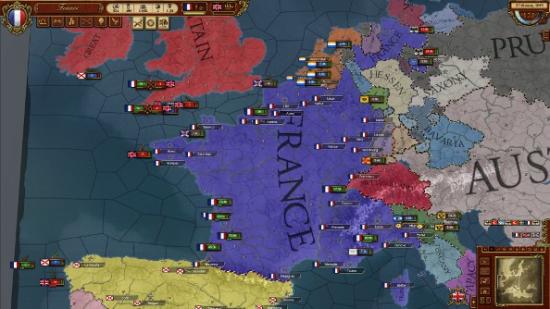Just over a week ago, I flew out to Iceland to attend the Paradox Con, the Swedish publisher’s annual showcase of upcoming games and expansions. This year, Paradox decided to do something a little different for those of us who specialize in strategy gaming. A few of us were invited to take part in a pair of multiplayer LAN sessions, one for March of the Eagles and one for Europa Unversalis IV.
March of the Eagles is a game about the Napoleonic Wars. Unlike most of Paradox Development Studio’s other strategy games, March of the Eagles takes place in a compressed time period and has some clear objectives. Even though the game starts with Napoleon vs. The World, each country has its own set of objectives for Land Dominance and Naval Dominance. To win the game, you want to achieve both, and you do so by capturing provinces that contribute to your Land or Naval Dominance. They’re different for each country, so it’s not like Russia needs to occupy London.
The catch is that even if you achieve all prerequisites, dominance only changes hands once the previously dominant power loses its dominance. Prussia needs for England to somehow lose Naval Dominance while the Prussian army goes around capturing key ports in Europe. That’s awkward because while different countries might be nominal allies, only one can be dominant when the wars end.
This was the stage for a grand-strategy deathmatch between me, PCGamesN regulars Joe Robinson and Paul Dean, the Escapist’s Greg Tito, PC Gamer’s T.J. Hafer, Destructoid’s Fraser Brown, and RPS’s Adam Smith. All our inter-website grudges, petty jealousies, and towering strategic arrogance took center stage as we battled to be the masters of Europe and the masters of strategy.
For me, these sessions were probably the highlight of the conference, one of the most entertaining and illuminating preview opportunities I’ve ever had. While we all had plenty to say about our sessions over beer and whale meat afterwards, Joe and I decided to compare notes about our experiences and discuss what we learned about Europa Universalis IV and March of the Eagles in the crucible of multiplayer combat.
Sad to say, I did not acquit myself well in March of the Eagles and may even have brought shame Great Britain as I fumbled an invasion of Holland, lost Gibraltar, and briefly misplaced Nelson somewhere in the Mediterranean. Joe was playing mighty Prussia.

Rob: My Three Moves Ahead colleague Troy Goodfellow calls March of the Eagles “a knife-fight in a telephone booth.” It’s an apt description. As Britain, I started the game already at war with France and Spain. A few minutes after that, I heard France was marching against Austria. After that, it was pure chaos.
England starts with a bunch of fleets, penny packets of troops scattered all over the Isles, and absolutely no friendly coastline for landing invasion forces. Gibraltar is protected by Nelson’s fleet and its own tough geography, but it’s a long way from any help. It’s a funny position: Britain is almost impotent on land, and unchallengeable at sea. I felt at once safe and useless.
But I thought that with Greg Tito’s Grande Armée busy in Austria, I could best contribute to the allied cause by harassing him in his backyard. My overall plan was to start raiding along the Channel coast, keeping France guessing about where I’d appear next and perhaps taking some of the pressure off the rest of you guys.
But first, I had to get ready. That meant sorting through all my armies, appointing commanders, collecting transport ships, and generally trying to scrounge up every last redcoat for an invasion of Holland. Based on the opening phase of my game, I’d have to say March of the Eagles is really a game of strategy and logistics, wouldn’t you agree?
Joe: Completely – read any history book on the period. The Napoleonic Wars were as much about fighting one’s own logistical problems than fighting any tangible opponent. In March of the Eagles, Supply and Manpower are two of the most important concepts in the game – without manpower, you can’t build new units or reinforce existing ones. If you don’t watch your supply limits well enough, you could lose too many units to attrition.
I’ve played as the UK before, and they do start out at a bit of disadvantage, I think. Like you said, they have armies all over the place, and half of it is made up of militia, which can take some time sorting through.
Prussia, who I was playing as for this session, starts out in a more reasonable position. It doesn’t have any navy to speak off, but to be honest Prussia doesn’t need a navy. All of it’s Naval Dominance objectives can be reached via land, so it’s a lot smarter just to focus on the land war with Prussia. And boy, did I fight one hell of a land war.
Rob: You make a really good point about militia, and it leads me to probably my biggest frustration with March of the Eagles: the sheer amount of work it takes to organize an effective army.
Let’s talk about my misadventure in the Netherlands, for instance. I had maybe 75,000 to 100,000 thousand soldiers in the British Isles. Maybe 30,000 of those were low-quality militia. But they were all mixed into groups with regular and Guard (elite) combat units. Meanwhile, I had enough transport capacity to move 25,000 men by sea in a single trip.

I wasn’t going to waste those precious transport slots on crummy militia. So while everyone else was getting involved in a Continental melee, I was trying separate my real combat troops from the militia. It was like sorting grains of rice.
Then you have the command structure, which I love and hate. Once you assemble your land army, in my case about 80,000 men bound for Amsterdam, you need to subdivide that stack into smaller units. This is true to the period: the big military revolution of this era is the corps and divisional command structure, which allowed for far larger armies to campaign and battle effectively.
Each stack requires an overall commander, and then someone commanding the left, right, and center wings of the unit. So just to do something as simple as launch an invasion with three stacks of almost 30,000, you need like 12 officers to lead it. And then to sort all those wings into their own combat forces.
At this point, I think my eyes glazed over. Especially in a multiplayer game, where everything is happening fast. I’ve played StarCraft matches with lower actions-per-minute than multiplayer March of the Eagles required.
Did you find it easier to manage all this stuff as Prussia? And hey, isn’t your army pretty elite, anyway?
Joe: Yeah, Prussia starts with way fewer stacks than Britain does, and there’s hardly any militia within those. The Prussian military is supposed to be pretty strong, although to be fair the real Prussian reforms that made it so badass didn’t happen until after they got kicked up and down the Rhineland by Napoleon. So at the opening period of the game we’re good, but not great.
Apart from numbers the main advantage France has over nearly everyone else is that they already have some tech-ideas unlocked in the land-area, so even in an equal fight their armies have an edge.
I find the tech-ideas system a bit pointless, really. It’s a great way to have technological progression without have to worry about having an entirely different system, like you find in most games like this. Learning through fighting is, on paper, a good way to do it.
I just don’t like the fact that you learn more by losing. During our session, I think I unlocked maybe one or two techs, because the baseline rate of idea points was so slow, and I rarely lost. You don’t really want to be losing battles in this game because once you’re out you’re out. The game’s time-span is so short, and everyone else would have such a huge advantage, that I doubt you’d be able to recover in time.
In terms of logistics though, I was able to leave many of my stacks ‘as is’ and just assign them generals, and then beef up their numbers a bit by adding in a more variety of units, like Light Infantry. I think the best part of March of the Eagles is comprising your stacks in certain ways in order to unlock the different tactics that each flank can use.
Personally, I was fan of using ‘Up the Guard’ on the centre flank, whilst the wing flanks had some combination of either Delay, Hold, or Entrenched Defence. Sometimes I used Deliberate Assault. Sure, it adds to the management as you have to pay attention to what units go in what flank, but to be honest, I don’t have the same problem with the interface as you do, Rob. It’s not great, but even when trying out the UK I didn’t seem to have the some problems you did.
Rob: Fair enough. I think the interface is good enough to get the job done, just a bit slow and click-heavy. But I couldn’t disagree more about the national ideas! I think they’re kind of brilliant.
I like how suffering a defeat teaches you the most, which makes sense because it’s often only defeat and humiliation that spurs reform. But it’s a risk, so it encourages hidebound elephants like Prussia, Russia, and Austria to hide behind lumbering legions while the French are able to play with more aggression and flexibility.
And trust me, troop numbers replenish quickly. Maybe you didn’t lose any massive stacks like I did, but I lost about 125,000 men in the Netherlands when Greg Tito’s Grande Armée finished up in Italy. That was most of my available manpower at the time. But by the end of the year, I had another 100,000 men ready to deploy and another 125,000 in manpower reserves. So I don’t think defeats are that severe. Not in terms of lost troops. In rebuilding time and territory, yeah, it can be pretty devastating.

But it seemed like there were a lot of comebacks in March of the Eagles. France got crushed against Austria, but rallied. I was smacked around in Holland, but came back with a massive invasion of Spain.
I’ll tell you one thing that caught me off guard, though: attrition. This ain’t Europa Universalis or Crusader Kings with slow, predictable losses. If you outrun your supply lines in March of the Eagles, you are setting yourself up for a pounding. Did you find supply issues played a major role in central Europe? Because when I was landing troops in Spain, or trying to hold Gibraltar, everything hinged on supply for me.
Joe: Ah, you’re arguing from the standpoint of playing as the UK which, like France, benefits from a lot more money, manpower and assets than nearly everyone else in the game.
Rob: I think you’re overestimating how many men England can field compared to France and most of the Continental empires, but I’ll grant I was never really in severe danger and the money never stopped pouring in.
Joe: Yeah, trust me, troops don’t replenish quickly if you’re fighting for most of the game, like I was. Depending on where your armies are and the local supply rating, reinforcements trickle to your armies periodically – it stops the manpower running low too quickly I think. There are things you can do to help, like building depots all over the place, but essentially once you get into a war, that’s it. The resources and everything you have have to last you until you win. Or get crushed. This is why March of the Eagles is a very short-term game, in a sense.
I think I started out with maybe 60,000 in manpower reserves. France declared war on me pretty quickly, and eventually Russia declared war on me as well, so there was no resting for me. I lost a stack pretty early on so I had to spend a lot replacing that army. I was lucky to get maybe 4K manpower a month, and for most of the war I was on 0 with a deficit growing larger and larger. Trust me, I had no legions to hide behind, and I had to run rings around France and Russia just to stop myself getting crushed. I used smaller, 20-30K mobile stacks and let my enemies come to me. Which to answer your question, I didn’t really have supply issues as I was fighting on my own turf a lot.
During the first half, after me and Austria teamed up to crush France’s Grande Armée, I then took my stacks into Alsace-Lorraine and those areas to start putting pressure on the french homeland. I suffered attrition but as I kept my stacks smaller, it wasn’t crippling or anything.
After Russia declared war on me though, my armies weren’t seen West of the Rhine again, I basically let Russia wear itself out taking my eastern fortresses, then I pounced on them and took it all back, but I didn’t step over the border as I knew the same thing would happen to me. I got a respite, then, but the Swedish AI also declared war on me. Plus, France was resurgent so I didn’t have very long to let my manpower try and catch up with my deficit.
Rob: You make a good point, and it’s something I’m really curious to see if March of the Eagles can pull off: the Napoleonic Wars lasted as long as they did in part because every coalition against France was so shaky and self-interested. It opens in 1805 just before Russia and Austria get crushed at Austerlitz, and in 1806 Prussia would pay its own price for sitting out the earlier war. But our game, once the battle lines were drawn, became this duel to the death. You were basically beset by enemies from the start and I’m not sure that’s how it is supposed to be. I suspect this may have had something to do with the grudges people carried over from EU IV.
If March of the Eagles plays out in a series of brief, cataclysmic wars broken up by periods of restless peace and rearmament, then I think some of your problems will be addressed because I do think March of the Eagles lets you recover strength fairly quickly if you can keep out the fighting for a bit. The victory conditions encourage this kind of selfish play: you don’t just want your coalition to win, but you want to be the dominant power on land and sea by the time the fighting is done. If everyone plays with that in mind, rather than “beat Napoleon” or “beat the three Emperors”, I think you’ll see that kind of stop-start warfare. But what I saw in practice was something closer to Total War.
Which I’m still okay with. March of the Eagles doesn’t need to be as deep as Europa Universalis or Crusader Kings. In many ways it’s just a terrific scenario, with clear challenges and opportunities. I’m very curious to see just how much one version of the Napoleonic Wars will diverge from another once we finally get our hands on it.
